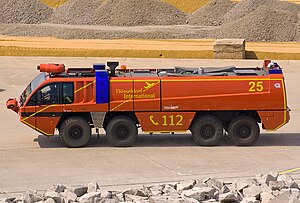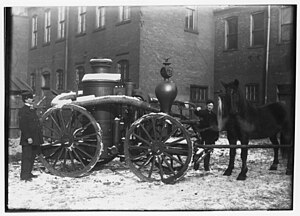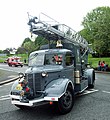Fire engine: Difference between revisions
George Swan (talk | contribs) (add image) |
George Swan (talk | contribs) (add image) |
||
| Line 1: | Line 1: | ||
[[File:Steam fire engine - DPLA - 8af84acc06b7a6384bfbaa609214695e.jpg | left | thumb | Early fire engines were dragged to the site of fires by horse power, or raw manpower.]] | [[File:Steam fire engine - DPLA - 8af84acc06b7a6384bfbaa609214695e.jpg | left | thumb | Early fire engines were dragged to the site of fires by horse power, or raw manpower.]] | ||
[[File:Fire-engine, Düsseldorf (4624530571).jpg | thumb | Some special purpose fire engines, like those used to fight fires on airport runways, carry their own reservoir of water, rather than connecting hoses to a [[Fire hydrant]].]] | |||
'''Fire engines''' are vehicles used by [[firefighter]]s.<ref name=FromBucket/> The earliest fire engines consisted of little more than a fire hose, and a pump, and possibly a small reservoir of water. The earliest fire engines were towed to the site of a fire by manpower, or horsepower. | '''Fire engines''' are vehicles used by [[firefighter]]s.<ref name=FromBucket/> The earliest fire engines consisted of little more than a fire hose, and a pump, and possibly a small reservoir of water. The earliest fire engines were towed to the site of a fire by manpower, or horsepower. | ||
| Line 9: | Line 10: | ||
<gallery> | <gallery> | ||
File:Honolulu Fire Engine 29 (29965103514).jpg | <!-- red --> | ||
File:00 7695 Feuerwehrfahrzeug - Norwegen.jpg | |||
File:Drehleiter Hannover W3.jpg | <!-- yellow --> | ||
File:Honolulu Fire Engine 29 (29965103514).jpg | |||
File:Fire Truck, UC Davis.jpg | <!-- orange --> | ||
File:Drehleiter Hannover W3.jpg | |||
File:NFS Wartime Fire Appliance GXN228 (1).jpg | <!-- blue --> | ||
File:Fire Truck, UC Davis.jpg | |||
File:Flintstone, MD Fire & EMS Parade 3 June 2011 (5879268224).jpg <!-- | <!-- gray --> | ||
File:NFS Wartime Fire Appliance GXN228 (1).jpg | |||
File:2023-02-22 13 46 54 A ladder truck from the West Trenton Volunteer Fire Company in a parking lot along Mercer County Route 634 (Parkway Avenue) in Ewing Township, Mercer County, New Jersey.jpg | <!-- green --> | ||
File:Flintstone, MD Fire & EMS Parade 3 June 2011 (5879268224).jpg | |||
<!-- white --> | |||
File:2023-02-22 13 46 54 A ladder truck from the West Trenton Volunteer Fire Company in a parking lot along Mercer County Route 634 (Parkway Avenue) in Ewing Township, Mercer County, New Jersey.jpg | |||
</gallery> | </gallery> | ||
Revision as of 05:14, 8 December 2023

Fire engines are vehicles used by firefighters.[1] The earliest fire engines consisted of little more than a fire hose, and a pump, and possibly a small reservoir of water. The earliest fire engines were towed to the site of a fire by manpower, or horsepower.
Later fire engines were built on trucks.[1]
Firefighters employ at least two different kinds of trucks, regular pumper trucks, and ladder trucks, capable of extending tall ladders to windows on some upper floors of burning buildings.
Fire engines are painted in high visibility colors, like red, white, or yellow. They are generally equipped with powerful sirens, turned on to indicate their mission will require them to break the usual rules of the road - like travelling through traffic stops where they do not have the usual right of way.
References
- ↑ 1.0 1.1 Herbert Theodore Jenness (2023). Bucket Brigade to Flying Squadron: Fire Fighting Past and Present. LEGARE STREET Press. ISBN 9781021649386. Retrieved on 2023-12-08.







